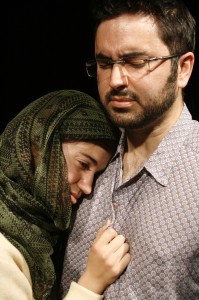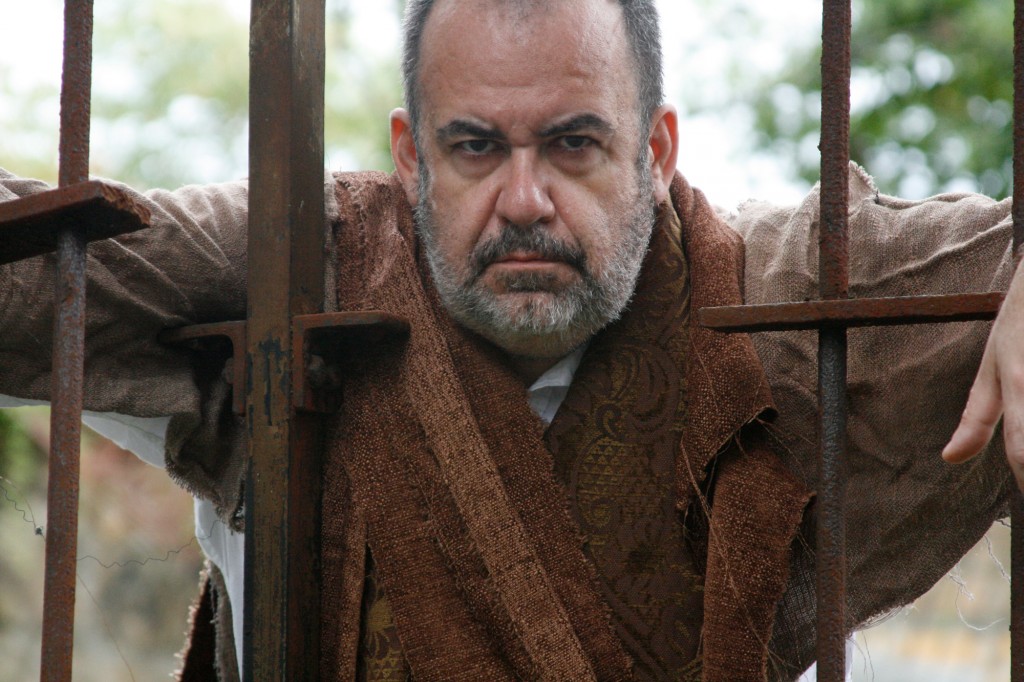Theater Review: Company One Exhibits a Ferociously Good “Bengal Tiger”
Bengal Tiger at the Baghdad Zoo is hard to categorize. It is both funny and dead serious, not exactly a black comedy but an idiosyncratic composite of many different dramatic antecedents.
Bengal Tiger at the Baghdad Zoo by Rajiv Joseph. Directed by Shawn LaCount. Staged by Company One at the Boston Center for the Arts, Boston, MA, through November 17.
By Helen Epstein

Hallie Friedman and Michael Dwan Singh in the Company One production of BENGAL TIGER AT THE BAGHDAD ZOO
I went to see Rajiv Joseph’s play, a finalist for the Pulitzer Prize, and came home impressed. Not only by the ambitious script but by the energy of 14-year-old Company One. It’s rare to see—at ticket prices that ordinary people can afford—a first-rate play performed by a first-rate cast in a 200-seat theater. The mix of audience members—young and old, urban and suburban, refreshingly multi-cultural—was invigorating after a summer of theatergoing amid aging, Caucasian heads, balding and/or graying, in the Berkshires.
I reviewed two of American playwright Rajiv Joseph’s plays over the summer (here and here) and was eager to see this earlier, longer, larger, and most publicized one. Joseph began writing it in 2003. Bengal Tiger had its debut in Culver City, California in 2009, was nominated for a Pulitzer in 2010, and reached Broadway in 2011, with Robin Williams famously playing the tiger imported to Iraq from India.
Joseph’s audacious idea is to superimpose the animal’s new home, the Baghdad Zoo, onto Hussein’s palatial topiary garden, which is in the middle of a burning city bombarded by the United States. Faulkner’s famous line “The past is never dead; it’s not even past” takes on new resonance here as, one by one, each of the characters, including the tiger, are killed and return as ghosts among the living.
Like Joseph’s other work, which challenges the predominately realistic framework of the American theater, Bengal Tiger is hard to categorize. It is both funny and dead serious, not exactly a black comedy but an idiosyncratic composite of many different dramatic antecedents. At times it sounds like a war play whose foul-mouthed Marines often evoke the bedeviled men in David Rabe’s Vietnam trilogy. But it’s also redolent of theater of the absurd. It’s an inquiry into the existence, including the possible meaning of God, conducted by a tiger/philosopher who evokes Samuel Beckett. It’s a Wagnerian and Tolkien-like saga built around the whereabouts of a pistol made of gold that symbolizes greed and violence. It’s also an exploration of the work and responsibilities of the artist/playwright in the person of Saddam’s gardener, the shaper of the topiary garden, who becomes an interpreter for the American military during the invasion. The script is intelligent and witty; the characters memorable. All in all, an enormous challenge for a young theater, let alone one that mixes Equity actors with students.
I’m delighted to report that Company One mostly rises to the occasion.
The play opens on the single set of white marble columns and arches and a metal gate: the space serves as the Baghdad Zoo, the Topiary Garden, and, perhaps, the Garden of Eden. The sound design by Edward Young is an eclectic mix of Arab instrumental music that, as the play begins, gives way to the sounds of crickets. Two nervous Marines, gangly, dopey, endlessly annoying Kevin (perfectly played by Michael Henry James Knowlton) and taut, disciplined Tommy (persuasively acted by Ray Ramirez) are guarding a lone tiger (a gravely ironic and interesting Rick Park, barefoot, bearded, without stripes) at the Baghdad Zoo. The lions have escaped and were shot dead for their daring. The tiger wonders, “Why am I here? Why aren’t I gone?”
Although I had expected the beast to be the central character, Bengal Tiger at the Baghdad Zoo is actually an ensemble piece featuring several other very compelling characters including Musa, Hussein’s troubled, Iraqi gardener, now a military interpreter for the Americans (sympathetically and subtly performed by Michael Dwan Singh; Saddam Hussein’s ruthless and remorseless son Uday (gleefully played by Mason Sand); and three Iraqi women played by Hallie Friedman and Salma Milia. Arabic is used when needed, sometimes translated, sometimes not. Among the many gags in the play: one of the transformations dumb Kevin undergoes after dying is that once he is a ghost he becomes fluent in Arabic.
Joseph’s situations are often impossible to predict, but his language keeps me focused on every line. The playwright has an extraordinarily sensitive ear; the play proffers a rich amalgamation of dialogue, jokes, and imagery. I found the repetitions of “Fuck,” “Bitch,” and “Motherfucker” redundant, and wished Joseph could have found more creative ways for his Marines to express themselves, but perhaps that was a deliberate choice on the part of the playwright, hewing to the reality he discovered during his research.
Shawn LaCount’s casting was excellent; his direction of the over two-hour long production was always clear, crisp, and never boring. The decibel level of the Marines was often too loud for my taste, but perhaps that was a deliberate directorial choice, a concession to realism. But these are quibbles. I’m pleased that LaCount chose to introduce Joseph’s work to Boston this season, and I urge anyone interested in serious, in-the-world theater to go see it.
Helen Epstein is the author of Joe Papp: An American Life and the translator of Acting in Terezin.
Tagged: Bengal Tiger at the Baghdad Zoo, Company One, Culture Vulture, Iraq, Rajiv Joseph, Rick Park

